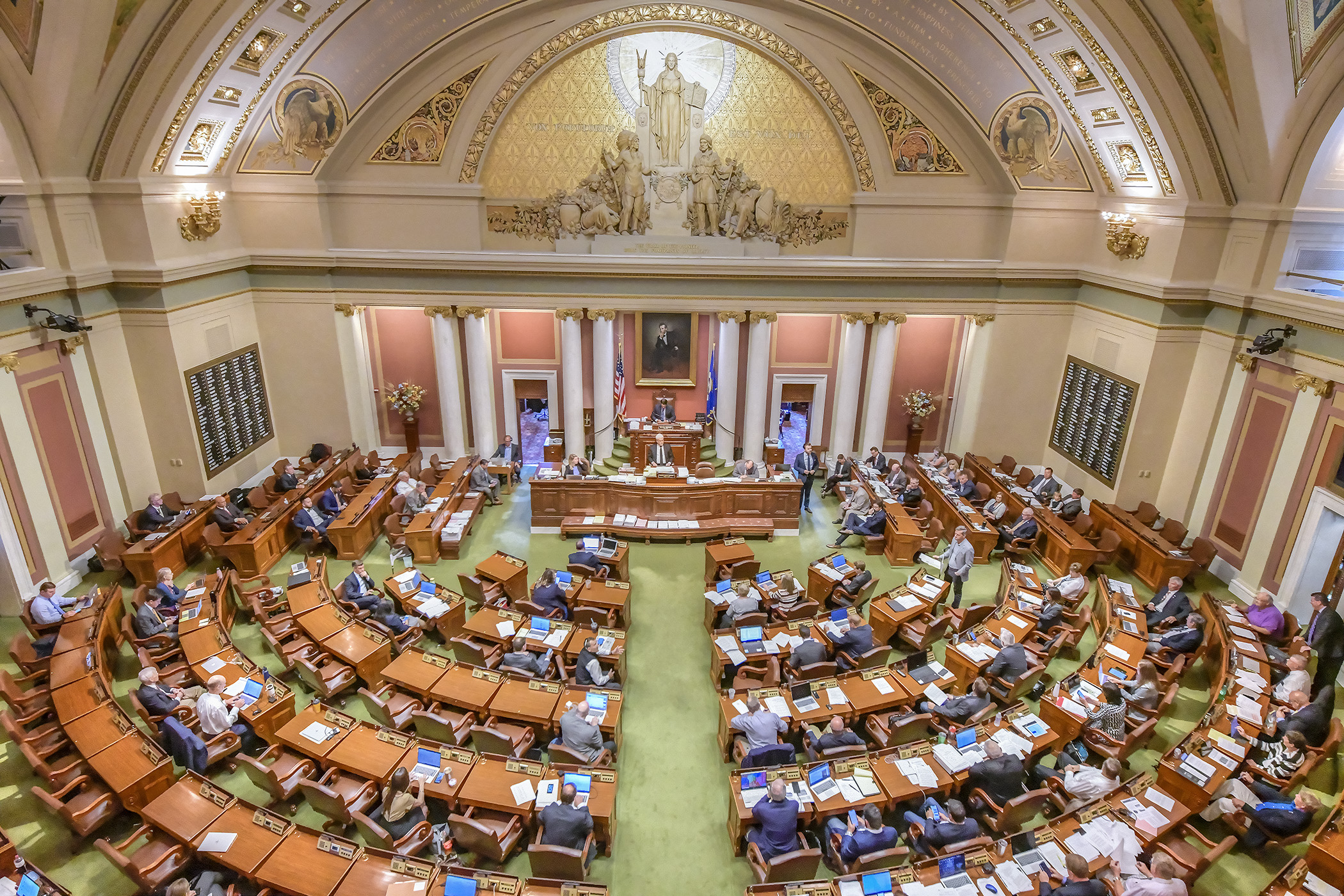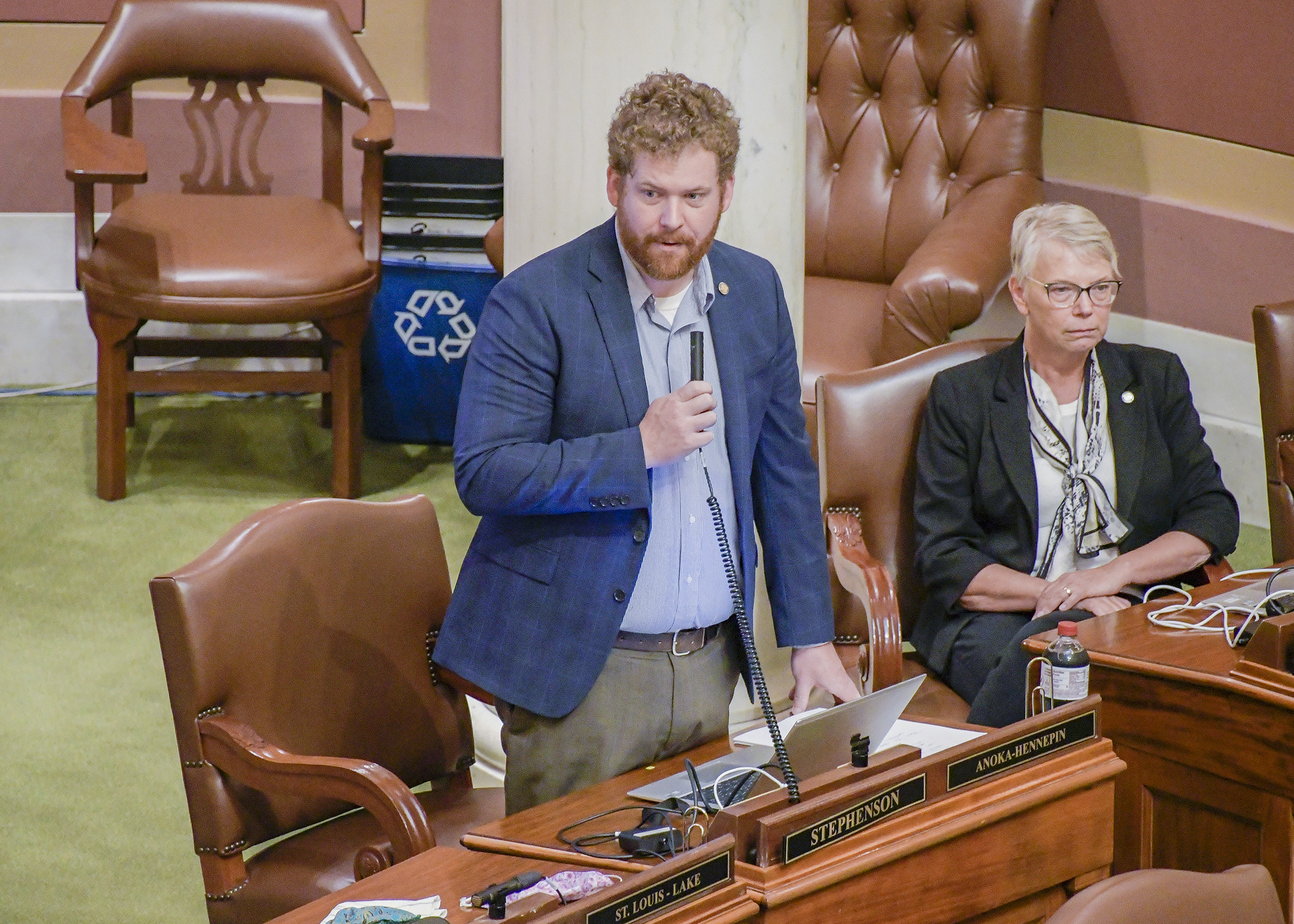With budget still unfinished, action on House Floor grinds to halt during daylong debate

The agenda for Thursday’s floor session called for energy to bat leadoff. The omnibus commerce, climate and energy finance and policy bill was to be the first of the budget bills to be debated by the full House during this special session.
And energy is something House Republicans used in an attempt to keep action from being taken.
After Rep. Tim O'Driscoll (R-Sartell) moved to re-refer the bill back to its committee of origin, 21 other Republicans rose to object to the process that created the bill, and that the bill doesn’t continue funding for the state’s health reinsurance program.
But, after a 12-hour filibuster — actually back-to-back filibusters, as motions were made to re-refer the bill to two different committees — the House eventually got down to debate on the bill at hand around 10:15 p.m. It was expected that SSHF6, as amended with a technical amendment, would become the first of the major budget bills to be passed this special session.
But, at 11:41 p.m., the House voted to table the bill. The other three omnibus bills on the agenda for the day — higher education, agriculture and Legacy — were similarly laid on the table.
If approved, likely when the House comes back at 10 a.m. Friday, the omnibus commerce, climate and energy finance and policy bill would then head to the Senate where Sen. Gary Dahms (R-Redwood Falls) is the sponsor. The companion bill he sponsors, SSSF19, was debated on the Senate floor Thursday, then tabled.
A compromise forged by a commerce and energy working group, the bill sponsored by Rep. Zack Stephenson (DFL-Coon Rapids) contains provisions that relate to the financing and operations of the Commerce Department, as well as deciding how funds from the Renewable Development Account will be divvied up.
 Rep. Zack Stephenson, chair of the House Commerce Finance and Policy Committee, presents the omnibus commerce and energy finance and policy bill on the House floor Thursday. Photo by Andrew VonBank
Rep. Zack Stephenson, chair of the House Commerce Finance and Policy Committee, presents the omnibus commerce and energy finance and policy bill on the House floor Thursday. Photo by Andrew VonBankThe bill would have a total impact on the General Fund for fiscal years ’21-’23 of $84.9 million, and would disburse $103 million over the same period from the Renewable Development Account, a state-administered fund designed expressly for the purpose of developing renewable energy sources in Minnesota.
Xcel Energy pays into the account with annual fees of between $350,000 and $500,000 for each cask of nuclear waste it stores at its Prairie Island and Monticello facilities.
[More: See bill details and view the spreadsheet]
On the commerce side, the bill would, among other things, establish a student loan borrowers’ bill of rights, create a catalytic converter theft prevention pilot project and a toxic toy enforcement program, and increase licensing and regulation of pharmacy benefit managers.
In the energy area, it would extend the cold weather rule period when utilities may not disconnect customers, establish an advisory committee to develop a statewide energy transition plan, and establish an energy transition office to assist communities and workers experiencing the retirement of an electric generating plant.
A topic that stimulated much debate was extending the state’s health reinsurance program, which would sunset under the bill’s language. That program, the Minnesota Premium Security Plan, is designed to provide stabilizing secondary insurance for health plans offering individual insurance policies in the state.
“We used money from another fund to create reinsurance, telling insurance companies that we would cover the high-risk claims,” said House Minority Leader Kurt Daudt (R-Crown). “So we saw rates stabilize and insurers came back into the marketplace. Thirteen or 14 other states have since followed us, and there has been stability in that individual marketplace since.”
Debate about the bill in House committees this week – and on the Senate floor Thursday – raised the question of whether some of the federal money coming to the state from the American Rescue Plan Act will essentially serve the same purpose as the reinsurance program.
“We have a couple of weeks to pass a $52 billion budget,” House Majority Leader Ryan Winkler (DFL-Golden Valley) replied. “The minority’s actions on this floor will not stop us from passing a budget by July 1. This represents an agreement between the majority and minority, and it is not the time to hold a budget hostage. To demand a renegotiation on reinsurance is an abdication of our responsibilities.”
Related Articles
Search Session Daily
Advanced Search OptionsPriority Dailies
Speaker Emerita Melissa Hortman, husband killed in attack
By HPIS Staff House Speaker Emerita Melissa Hortman (DFL-Brooklyn Park) and her husband, Mark, were fatally shot in their home early Saturday morning.
Gov. Tim Walz announced the news dur...
House Speaker Emerita Melissa Hortman (DFL-Brooklyn Park) and her husband, Mark, were fatally shot in their home early Saturday morning.
Gov. Tim Walz announced the news dur...
Lawmakers deliver budget bills to governor's desk in one-day special session
By Mike Cook About that talk of needing all 21 hours left in a legislative day to complete a special session?
House members were more than up to the challenge Monday. Beginning at 10 a.m...
About that talk of needing all 21 hours left in a legislative day to complete a special session?
House members were more than up to the challenge Monday. Beginning at 10 a.m...